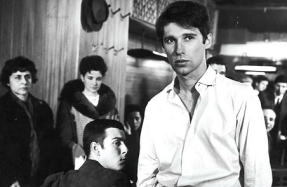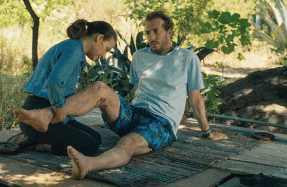Teaching an online course on Agnes Varda at the School of the Art Institute this fall for 39 students has put me in regular touch with Criterion’s superb 15-disc Blu-ray box set The Complete Films of Agnès Varda every week. The packaging reminds me in some ways of the handsome 78 rpm albums I used to cherish as objects and totems in the mid- to late ’40s, when I was still a toddler, although Criterion’s version of this sort of assembly, held in a box, manages to be neater and more compact. There’s also a richly illustrated and annotated 200-page book inside the box, with essays by Amy Taubin, Ginette Vincendeau, So Mayer, Alexandra Hidalgo, and Rebecca Bengal, and excellent “program notes” on all the films by Michael Koresky. In short, plenty to keep a coronavirus shut-in busy, even without a course to teach.
The course has gradually brought home to me the complexly ambiguous lesson that Varda wasn’t really or exactly an auteur, at least not in the boys’-club meaning of that term as it’s most commonly used. But not being an auteur gave her a kind of freedom and a form of elasticity denied to most auteurs. I’m reminded of a problem I once heard Terry Gilliam expound upon at the Festival of the Midnight Sun in Lapland. To paraphrase his complaint, as I remember it: “All day long I’m surrounded by people who spend their lives trying to think up ‘typical Terry Gilliam touches,’ while I personally would much rather be doing something else, something atypical”—which is precisely what Varda most often wound up doing, frequently to both her profit and ours.
But much as typecasting is often the bane yet sometimes the triumph of much Hollywood acting, it also can sometimes shape auteurist thinking, beneficially or harmfully, by seemingly imprisoning both directors and the ways we accustom ourselves to thinking about them or expecting them to behave. The fact that Varda wasn’t really a cinephile, unlike her equally cross-referencing husband Jacques Demy, may have played a part in her not behaving like an auteur and approaching each project like a resourceful dilettante, starting from scratch. Learning, from a 2003 conversation with Polish composer Joanna Bruzdowicz (one of the Criterion set’s many extras), how Varda came up with the music and dolly shots in her masterpiece, (1985), shows an independence and freedom of thought that arguably comes, at least in part, from not worrying






